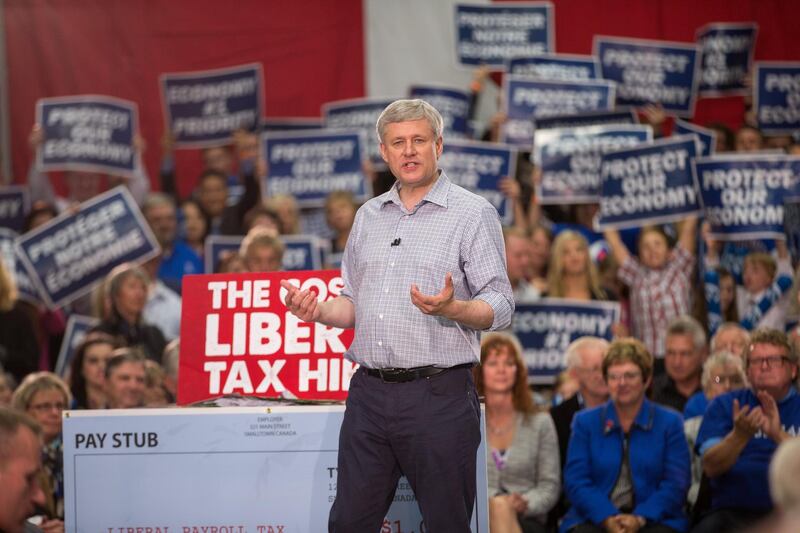French President Emmanuel Macron’s stinging rebuke of Donald Trump’s "America First" policy at the centenary commemoration of the First World War Armistice was another example of the “disconnected elitism” fuelling populism throughout the western world, according to former Canadian prime minister Stephen Harper.
In an interview with The National on Monday, he traced what he believed were the origins of the surge of populist movements that have toppled or shaken governments from Budapest to Brasilia.
Out of touch political and economic elites were leaving the working and middle classes disillusioned, Canada’s former conservative premier said, and Mr Macron’s speech was but another moment that showed he was out of touch with the dissatisfaction that has catapulted Mr Trump and other nationalist leaders to power.
The French leader has pushed a message of multilateralism after United States criticism of the United Nations, Nato and the European Union. He used the gathering of world leaders in Paris on Sunday to reiterate this call for co-operation.
In the thinly-veiled attack on Trumpism, he said “nationalism is a betrayal of patriotism”, the “ancient demons” that caused the First World War were once again rearing their heads and those who put themselves first would lose their “moral values” as a nation.
"That's an example of disconnected elitism. Populations are naturally nationalistic and proud of their country, as they are in France by the way. So, you know, I mean this is the big reason why Trump is president," said Mr Harper, who is promoting his book about the rising populist movements in the West, Right Here, Right Now: Politics and Leadership in the Age of Disruption.
“I don’t think you can fault Donald Trump. I don’t think it’s ever reasonable to fault the president of the United States for believing in the United States, any more than I would find fault with the president of France if he believed in France.”
He called the French leader’s distinction between patriotism and nationalism “largely meaningless” and said the “less than fully-fledged patriotism” shown by the campaign of Hillary Clinton helped Mr Trump to his surprise presidential win in November 2016.
Canada, which Mr Harper led from 2006 to 2015, has managed to avoid a populist surge, but he attributes the hard-right turns seen in countries such as Italy, Austria and Hungary to voters looking elsewhere for solutions as they are found lacking in the mainstream.
Helping this populist wave of discontent is the continued anger against the European Union, which Mr Harper says has been caused by “elites getting out in front of people and pulling them along”, on a European project many do not want.
_______________________
Read more:
Explainer: What is behind Italy's fall-out with the European Commission?
Coalition partner gives Merkel ultimatum after state election reverse
Far-right party threatens to tarnish Italian democracy
_______________________
While he says he does not agree with every policy of Mr Trump, Hungarian Prime Minister Viktor Orban or Italy’s far-right poster boy Matteo Salvini, Mr Harper believes the underlying concerns they are trying to address are legitimate, from the economy to trade and immigration.
“I worry about our societies if we don’t respond to public concerns, if we try to dismiss every concern on the left as communist and every concern on the right as fascist and we have an unresponsive political system, that is how we will produce political extremes,” he says.
But what about the authoritarianism that creeps alongside these movements, the harsher rhetoric against migrants and the rising hate crimes seemingly stoked by the political atmosphere? For example, hate crimes in Britain increased 30 per cent in 2017, the year after the Brexit vote.
“Is there some anger, is there some demagoguery in some of the populist movements? Yes. But traditional movements are not immune from that,” he says.
He sees a new wave of extreme leftists, spearheaded by socialist politicians such as Bernie Sanders and British Labour leader Jeremy Corbyn, as a “much greater risk” than Mr Trump as they could try to upend the entire democratic capitalist system.
For many who have borne witness to the renewed assault on the “outsider” in Europe, from Germany to Italy to Britain, Mr Harper’s comments will be galling. But he clarifies that the only way to address the root of toxicity in society is to address policies on the side of the will of the masses.
“Can these movements take these countries in a more extreme and authoritarian direction? Sure. But I think that has to be evaluated on its merits. I hear this complaint about Mr Trump but it seems to me he operates entirely in the US system of government,” he says.
If politicians create problems in the realms of immigration or trade and the public demonstrates their rejection of the results, ordinary people cannot be condemned. “You have to look in the mirror and fix the problems so you get better outcomes,” he says, appearing to reference the leftist and centrist movements across the West that are struggling to keep up with this new populism.
“The challenge is to fix the policy, not to try and find ways of excusing policymakers for ignoring the problems and not fixing them,” he says, when asked about the dark side of the populist movements.
“I’m confident that if you address those real concerns, with good policies that respond to their needs, they will respond positively. But, if you dismiss them, they will only get angrier.”






